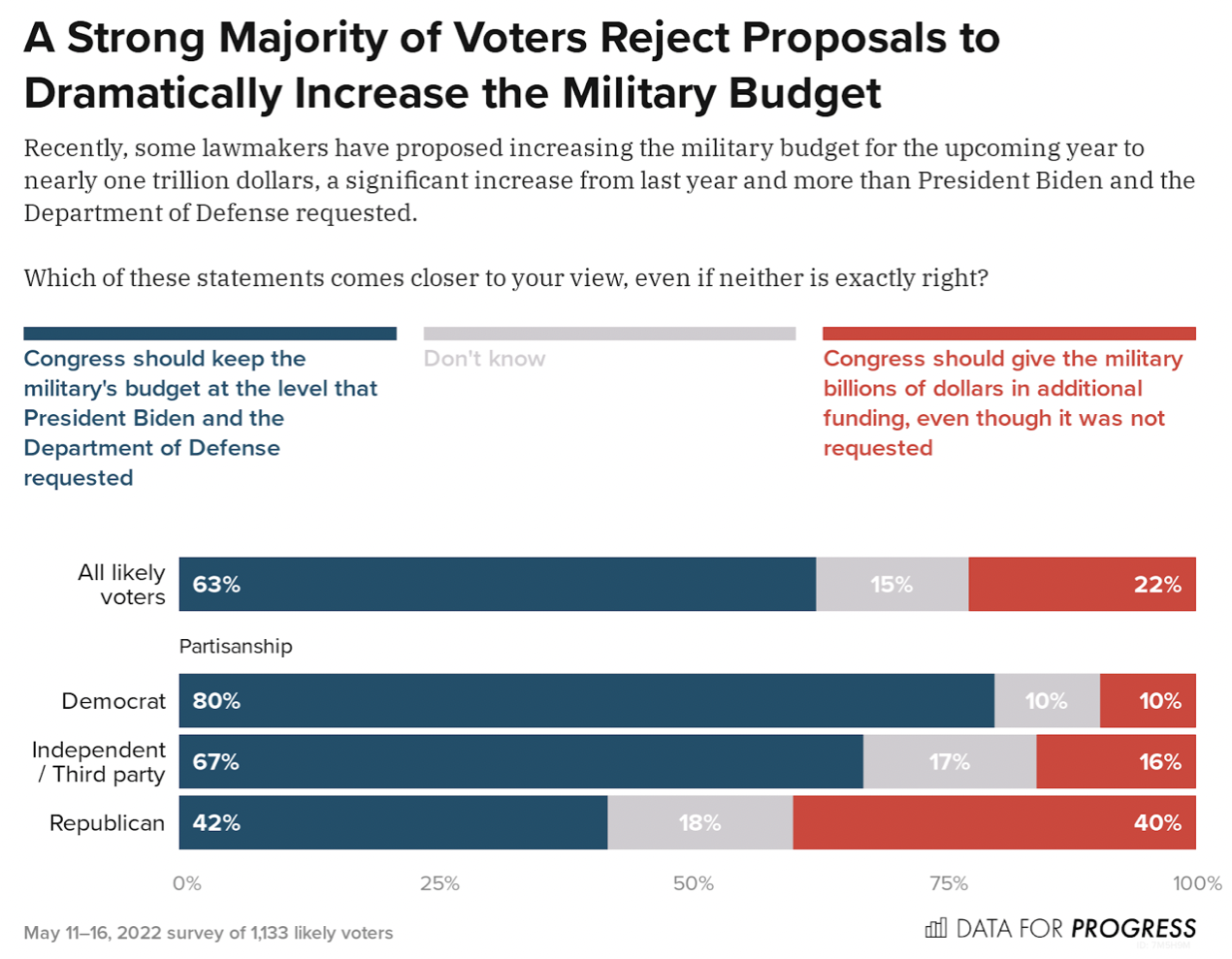Americans Widely Reject Proposals for More Pentagon Spending — So Should Congress
By Robert Weissman
The United States spends, by far, more on its military than other nations. U.S. military spending is more than the next nine countries combined; it is 12 times the amount Russia spends.
Yet demands persist from the military-industrial complex to spend ever more. For the upcoming year (fiscal year 2023), the Biden Administration has requested a $31 billion increase in Pentagon spending, to $813 billion.
Congress is poised to add even more to that total — with some saying the United States should spend a trillion dollars on the military budget. The House and Senate Armed Services committees are expected to vote in June on spending levels in the National Defense Authorization Act.
Polling from Data for Progress and Public Citizen in May 2022 indicates that spending more on the military than requested by President Biden would be out of step with the public. The polling shows:
A strong majority of voters oppose an increase in military spending above Biden’s request. Sixty-three percent of those polled say the military's budget should remain at the level that Biden and the Department of Defense requested.
Military spending concerns a majority of Americans, with 55 percent of voters reporting they are “somewhat concerned” or “very concerned” about current proposals for $813 billion in defense spending next year.
Democrats overwhelmingly say Pentagon spending should not exceed current levels when thinking about proposals to increase funding (83 percent say spending levels are too high or should remain the same, while 8 percent say military spending should be higher).
When informed about how much the military is poised to receive, as compared to other agencies, a majority of Republican voters say the military budget should not be raised further (51 percent, versus 37 percent who think too little is spent).
There are very strong policy arguments to cut military spending significantly. Not only does the United States vastly outspend other nations, it doesn’t effectively manage what it does spend. The Pentagon is unable to pass an audit, and Pentagon spending is replete with waste and fraud both small (a spare parts maker with a 3,800 percent profit level) and large (the defective and dysfunctional F-35 program that will cost more than $1.7 trillion over its projected 50-year lifespan, according to the Project on Government Oversight). And money allocated to the Pentagon is money that could instead be spent on priority domestic and human needs, and to ensure true national security.
For example, last year Congress increased Pentagon spending by $28 billion over the Biden Administration’s request. That same amount could instead have been spent to scale up global vaccine production and end or at least diminish dramatically the pandemic. Did the extra $28 billion for the Pentagon do anything to make us safer? By contrast, is there any doubt that our national security would have been massively improved if we had helped vaccinate the world?
Pentagon cuts also are popular. Fifty-six percent of Americans supported reinvesting 10 percent of the Pentagon budget into coronavirus relief, housing, and education in the first year of the pandemic, according to Data for Progress polling.
In this immediate moment, however, the congressional debate is not about Pentagon cuts, but about further increases. Those arguing for more Pentagon spending say it is necessitated by inflation. This argument ignores the fact that the Biden request already accounted for inflation and the fact that the Pentagon does not experience inflation in the same way as the general economy, in part because many of its costs are set by long-term contracts. Others say the Ukraine war necessitates more spending. But the U.S. already spends far more than Russia, and Ukraine-specific expenses are being funded by supplemental spending bills and should not be incorporated into the Pentagon’s base budget.
The arguments for still more Pentagon spending are, in short, red herrings. But that’s no surprise. In truth, no matter what Pentagon spending level Biden proposed, the military-industrial complex would respond with the same one-word answer: more.
It’s not an argument the American people are buying, however. Congress shouldn’t either.
Robert Weissman (@rob_weissman) is the President of Public Citizen.



